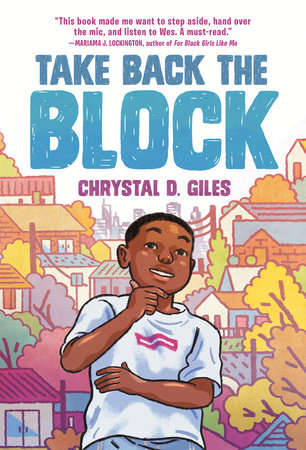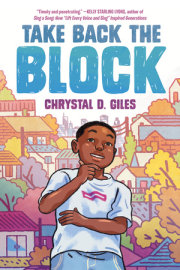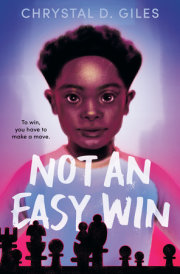I spent the morning of my eleventh birthday carrying a sign that read we were here first!
There are so many other things I could have been doing on my birthday, but there I was, the only kid, as usual. I had no chance of blending in with the sea of old ladies. Mom didn’t like me calling the ladies old, but they were old.
I walked a few steps back from everyone, ducking behind my sign as cars sped by. No way was I going to be spotted by some kids from my school. We were out for the summer, but I couldn’t be too careful.
It was a thousand degrees outside, and my favorite Carolina Tar Heels blue T-shirt was sticky and clung to my chest. It didn’t even match my Nike Air Max anymore. My kicks were now dusty and barely blue. That was my fault, though; I never should have worn my good stuff to trample through dirt.
“Wes, hold the sign up straight and uncover your face,” Mom said.
“Come on, Mom, it’s hot and I’m thirsty.”
“Don’t backtalk me!”
I knew better than to talk back, but it was too hot for manners. I wiped the sweat from my forehead and swallowed a glob of spit to wet my throat.
It didn’t help.
This was the third march this month, all part of a monthlong protest. The third Saturday I was here instead of playing NBA 2K with Brent and Alyssa. This week’s protest was the largest so far. Thirty of us stepped over bricks and construction trash, chanting, “Stop tenant replacement!” Which didn’t make much sense, because there were no tenants left to replace.
I got why we were there, but I was a little tired of fighting battles that didn’t have anything to do with me, though Mom thinks we belong in the middle of every fight.
This month, we were fighting the development of a new condo building—twenty stories, dark gray tinted glass, space beneath for shops, and even a video game lounge.
I wasn’t sure what the big deal was—I thought it sounded pretty cool. The apartment buildings on this street were old and beat-up. New stores would be nice. I didn’t say that out loud, though, or I would have had to suffer through at least thirty minutes of enlightenment on history and heritage. Mom always has a speech ready.
Construction on the new building hadn’t started yet, but demolition of the old apartment complex had. The tenants had moved out a couple of weeks ago, and now single shoes, stained mattresses, and smashed furniture were the only proof anyone had ever lived here at all.
Just as we rounded the site for the hundredth time, I saw a Channel 9 WCTV news van parked on the street in front of the construction site.
“Oh no!” I said under my breath.
A skinny camera operator unloaded a camera and tripod from the van—he set up to film right in the middle of the protest.
Oh shoot! He looked straight at me.
Mom turned and yelled to the group from her spot up front. “This is our moment!”
Roars from the crowd got louder. The old ladies started a new chant: “Whose city? Our city!”
There was no way I was going to be on the TV news or anywhere near that camera. I’m not exactly the best at speaking in front of people. My mind gets all blurry, and I forget how to talk. I’d be the biggest clown on the block if my friends saw me freeze up on TV again. There was this one time, last year, I was at the Don’t Wreck the Rec recreation center cleanup day (boring, I know) and a news anchor asked me why the rec center was important to me. I stood there with a microphone in my face, a cottony mouth, and a fuzzy brain, trying to come up with an answer. Those ten seconds felt like an hour, and I literally came up with zero. It was a complete fail, and since it aired on live TV, I got no do-overs. I wasn’t going to let that happen again.
As our group marched toward the news van, I broke away and raced in the opposite direction. I needed somewhere to hide—and quick! I spotted a porta-potty, darted behind it, and dropped to the ground.
As soon as I did, I smelled the funky stench flowing from the poop closet. I inched from behind the potty to find somewhere else to hide—nope, nothing. I was stuck breathing in somebody else’s stink juice until the news crew left.
From my hiding spot, I snuck a look at the ladies taking turns speaking into the microphone—they had no problem saying exactly what they meant. This was going to take a while. I passed the time by counting how long I could hold my breath before my lungs started to burn and I had to exhale and inhale again.
After six times, I got up to forty-five seconds before I was gasping for air. When I stuck my head out to get a peek at the news crew again, I saw a second group of protesters starting to arrive across the lot. They were here to trade places with the morning group, which meant Mom and I could leave. Finally! I crawled from behind the porta-potty and rushed past the new group, not even looking back to say goodbye.
A pile of broken concrete blocks was the last thing between our car and me. I leapt on top of it to shorten my path to freedom. I miscalculated my step and stumbled forward, right into a jagged edge of rock. A strip of blood leaked out of my scratched shin. I kept going.
I turned to see Mom trading hugs with a few of the ladies. “Stay strong!” she called out, her fist raised in the air.
I slumped into the passenger seat and cranked the AC to high as soon as Mom started the car. I hoped she hadn’t noticed I’d been MIA when the news crew arrived. Instead, I tried to distract her by using the time on the short drive home to ask about my birthday presents.
“So, Mom, I have to have at least one more pair of shoes. I can’t start school with last year’s shoes.”
“Shoes are the last thing you need to be asking for, Wes. There are many more important things in life,” Mom said, her eyebrows scrunched and uneven.
That shut me up real quick. Mom always has a way of making me feel guilty about having things other people don’t have. I’d rather eat dirt than listen to another lecture on counting blessings. Plus, if we’re going to compare, lots of people have way more than I have—I’ve seen sneakerheads on YouTube with a whole room of shoes. I took a deep breath and tried to forget about the protest.
My breaths got lighter as soon as I saw the rickety k ington oaks sign. The e and n were missing, but I was home. Entering Kensington Oaks is like being hugged by a grove of oak trees and sunshine. I’ve lived in the Oaks my whole life, and I’ve known all my neighbors since the days of tricycle races. The houses and yards are small, but that just means I can hop from one yard to the next quick enough to make it home before the streetlights come on.
The Oaks is an inner-city neighborhood—well, that’s what they call it on the evening news. I guess that means it’s a neighborhood full of poor Black people. To us it’s a cocoon in the middle of a crowded city, just eight blocks from the center of town.
Even though we’re surrounded by noise, the Oaks is calm—quiet, even. That’s mostly because of the community’s board of organizers. Mom is the board’s director. Yep, that means I’m a volunteer, by default.
When Mom pulled into our driveway, I spotted Mr. Hank waving from his porch across the street.
I hopped out of the car and headed his way.
“Wassup, Mr. Hank?” I said.
Copyright © 2021 by Chrystal D. Giles. All rights reserved. No part of this excerpt may be reproduced or reprinted without permission in writing from the publisher.





